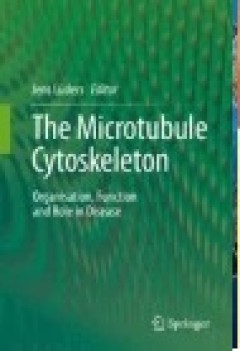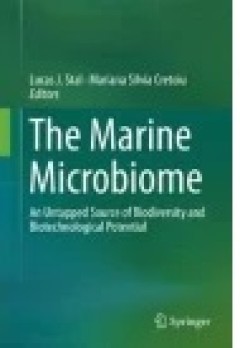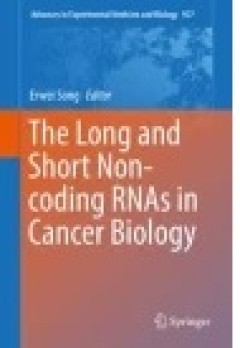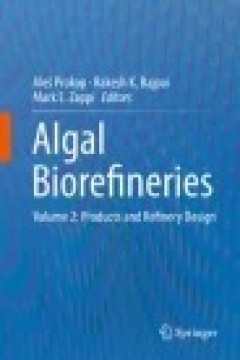Filter by

The Microtubule Cytoskeleton
This book provides an overview on the organization and function of the microtubule cytoskeleton, which is essential to many cellular processes and profoundly linked to a range of human diseases. Covering basic concepts as well as molecular details, the book discusses how microtubules are nucleated and organized into ordered arrays, at different cell cycle stages and in distinct cell types. In a…
- Edition
- -
- ISBN/ISSN
- 978-3-7091-1901-3
- Collation
- VII, 189
- Series Title
- -
- Call Number
- -

Receptor Tyrosine Kinases: Family and Subfamilies
This book devotes a chapter to each RTK family and the multiple receptors within each family, thoroughly covering all of the RTKs. The chapters all follow the same structure, presenting this essential information in an accessible and user-friendly format. Each chapter covers one specific family of receptors and begins with a general introduction to that family and a comprehensive discussion of …
- Edition
- -
- ISBN/ISSN
- 978-3-319-11888-8
- Collation
- -
- Series Title
- -
- Call Number
- 571.6

Receptor Tyrosine Kinases: Structure, Functions and Role in Human Disease
Receptor Tyrosine Kinase: Structure, Functions and Role in Human Disease, for the first time, systematically covers the shared structural and functional features of the RTK family. Receptor Tyrosine Kinases (RTKs) play critical roles in embryogenesis, normal physiology and several diseases. And over the last decade they have become the Number 1 targets of cancer drugs. To be able to conduct fun…
- Edition
- -
- ISBN/ISSN
- 978-1-4939-2053-2
- Collation
- -
- Series Title
- -
- Call Number
- 571.6

Alien Species and Insect Conservation
This overview of the roles of alien species in insect conservation brings together information, evidence and examples from many parts of the world to illustrate their impacts (often severe, but in many cases poorly understood and unpredictable) as one of the primary drivers of species declines, ecological changes and biotic homogenisation. Both accidental and deliberate movements of species are…
- Edition
- Ed. 1
- ISBN/ISSN
- 978-3-319-38774-1
- Collation
- XII, 230
- Series Title
- -
- Call Number
- 592 NEW a

The Mathematics Behind Biological Invasions
This book investigates the mathematical analysis of biological invasions. Unlike purely qualitative treatments of ecology, it draws on mathematical theory and methods, equipping the reader with sharp tools and rigorous methodology. Subjects include invasion dynamics, species interactions, population spread, long-distance dispersal, stochastic effects, risk analysis, and optimal responses to in…
- Edition
- -
- ISBN/ISSN
- 978-3-319-32043-4
- Collation
- XVI, 362
- Series Title
- Interdisciplinary Applied Mathematics
- Call Number
- 510

The Marine Microbiome
The marine microbiome is the total of microorganisms and viruses in the ocean and seas and in any connected environment, including the seafloor and marine animals and plants. The diversity of microbial life remains unquantified and largely unknown, and could represent a hidden treasure for human society. Accordingly, this book is also intended to connect academics and industry, providing essent…
- Edition
- -
- ISBN/ISSN
- 978-3-319-33000-6
- Collation
- XIV, 498
- Series Title
- -
- Call Number
- 660.63

Algorithms in Bioinformatics: 15th International Workshop, WABI 2015, Atlanta…
This book constitutes the refereed proceedings of the 15th International Workshop on Algorithms in Bioinformatics, WABI 2015, held in Atlanta, GA, USA, in September 2015. The 23 full papers presented were carefully reviewed and selected from 56 submissions. The selected papers cover a wide range of topics from networks to phylogenetic studies, sequence and genome analysis, comparative genomics,…
- Edition
- Ed. 1
- ISBN/ISSN
- 978-3-662-48221-6
- Collation
- XX, 328
- Series Title
- Lecture Notes in Computer Science
- Call Number
- 511.8 ALG a

The Long and Short Non-coding RNAs in Cancer Biology
The book conveys a comprehensive knowledge of long and short ncRNAs in cancer regulation and their potentials as diagnostic biomarkers and therapeutic targets. Topics covered include the molecular mechanisms of various classes of ncRNAs (with emphasis on long non-coding RNAs and microRNAs) in cancer, the functional roles of ncRNAs in regulating different cancer hallmarks (including proliferatio…
- Edition
- -
- ISBN/ISSN
- 978-981-10-1498-7
- Collation
- VIII, 458
- Series Title
- Advances in Experimental Medicine and Biology
- Call Number
- -

Algal Biorefineries: Volume 2: Products and Refinery Design
Algae offer potential to produce renewable chemicals and fuels using solar energy and carbon dioxide from atmosphere or in flue gases while simultaneously reducing the generation of greenhouse gases. Since these can be grown on marginal lands with micronutrients and macronutrients often present in waste streams, algae-based chemicals and fuels do not compete with foods. Still large-scale produc…
- Edition
- Ed. 1
- ISBN/ISSN
- 978-3-319-20200-6
- Collation
- VIII, 557
- Series Title
- -
- Call Number
- 576 ALG a

Algae and Environmental Sustainability
This book presents the dynamic role of algae in a sustainable environment. Two major aspects, namely bioenergy and bioremediation, have been elaborated in various chapter contributed by scientists and teachers from different geographical areas throughout the world. Algal biofuels is an emerging area of equal interest to researchers, industries, and policy makers working or focusing on alternati…
- Edition
- Ed. 1
- ISBN/ISSN
- 978-81-322-2641-3
- Collation
- XVIII, 181
- Series Title
- Developments in Applied Phycology
- Call Number
- 576 ALG a
 Computer Science, Information & General Works
Computer Science, Information & General Works  Philosophy & Psychology
Philosophy & Psychology  Religion
Religion  Social Sciences
Social Sciences  Language
Language  Pure Science
Pure Science  Applied Sciences
Applied Sciences  Art & Recreation
Art & Recreation  Literature
Literature  History & Geography
History & Geography